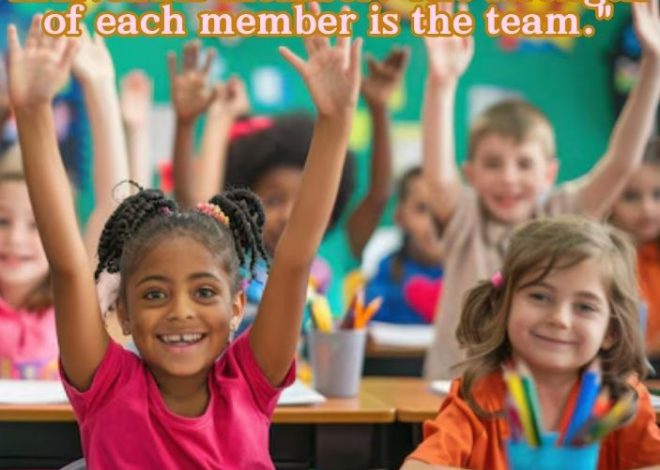
For 5 to 10 years, Building Confidence: Encouraging Kids to Believe in Themselves.
Confidence is one of the most valuable traits a child can develop. It serves as the foundation for a positive self-image, resilience in the face of challenges, and the courage to try new things. Confidence helps children feel secure in their abilities, embrace learning opportunities, and build strong relationships with others. Encouraging children to believe in themselves is a lifelong gift that sets them up for success in many aspects of life. In this article, we’ll explore how confidence develops in children and practical ways to encourage self-belief.
The Importance of Confidence in Children
Confidence is not just about believing that you can succeed; it’s about feeling comfortable with who you are, recognizing your strengths and weaknesses, and having the courage to keep trying even when things get tough. For children, confidence impacts a wide range of areas, including:
- Learning and Education: Confident children are more willing to participate in class, ask questions, and take academic risks. They’re less likely to give up when faced with a difficult task, and they tend to enjoy the learning process more.
- Social Skills: Children who are confident are more likely to initiate friendships, engage in group activities, and communicate effectively. They trust their social abilities, which helps them interact well with peers and adults.
- Emotional Resilience: Confidence helps children navigate the ups and downs of life. When they feel good about themselves, they are better able to handle disappointments, setbacks, and failures without feeling defeated.
- Independence and Responsibility: Children who believe in themselves are more likely to take on responsibilities, try new experiences, and make decisions that reflect their values and interests.
How Confidence Develops in Children
Confidence doesn’t emerge overnight. It’s a gradual process that develops over time and is influenced by various factors, such as a child’s environment, interactions with others, and personal experiences. Some key stages in the development of confidence include:
- Infancy and Early Childhood (0-5 years): During the first few years, children develop foundational feelings of safety and trust in their environment. A nurturing, responsive caregiver helps establish a sense of security, which is essential for later self-confidence. Children begin to gain confidence in their own abilities as they master basic skills, such as crawling, walking, and speaking.
- Early School Years (5-7 years): As children begin school, they experience a broader range of social interactions and start to evaluate their abilities against those of their peers. Positive reinforcement from teachers, friends, and family helps them understand that their efforts lead to success. Negative experiences, like failure or teasing, can have an impact on their self-esteem, but supportive adults can help children bounce back.
- Middle Childhood (7-10 years): During these years, children refine their skills and begin to establish interests and preferences. They start to set personal goals, and their experiences—whether positive or negative—play a significant role in shaping their self-belief. Confidence is often tested in academic challenges, sports, social situations, and extracurricular activities.
Practical Ways to Encourage Confidence in Children
As parents, caregivers, and educators, there are numerous ways to actively encourage children to believe in themselves. Here are some strategies that can help:
- Praise Effort, Not Just Achievement
While it’s important to praise children for their accomplishments, it’s even more crucial to emphasize the effort they put in. Praising hard work and perseverance fosters a growth mindset, where children understand that success comes from practice and learning from mistakes, not just innate ability. For example, instead of saying, “You’re so smart!” say, “I’m proud of how hard you worked on that project!” This type of praise helps children feel good about trying their best, regardless of the outcome.
- Set Realistic Expectations
While it’s important to challenge children to reach for their goals, setting expectations that are too high can lead to frustration and feelings of inadequacy. Help children set achievable goals that match their abilities, and support them along the way. As they accomplish these goals, their confidence will grow, and they will be motivated to take on new challenges.
- Encourage Independence
Encouraging children to do things for themselves, whether it’s tying their shoes, completing a homework assignment, or making their own lunch, helps them develop a sense of competence and autonomy. When children accomplish tasks on their own, even small ones, they gain confidence in their abilities. Start with simple tasks and gradually move to more complex ones as they grow and develop new skills.
- Create a Positive, Supportive Environment
Children thrive in environments where they feel safe, accepted, and loved. Foster a positive home and school environment by offering encouragement, avoiding criticism, and actively listening to their thoughts and feelings. When children feel emotionally supported, they are more likely to take risks and challenge themselves without fear of judgment.
- Teach Problem-Solving Skills
When children encounter challenges, it’s tempting for adults to jump in and solve the problem for them. However, allowing children to work through difficulties on their own helps them develop problem-solving skills and builds resilience. Instead of giving answers immediately, ask guiding questions that encourage children to think through solutions, such as, “What do you think would happen if you tried this?” or “What other options do you have?”
- Model Confidence and Positivity
Children learn a great deal from observing the behaviors of adults. If they see their parents, teachers, or caregivers demonstrating confidence, resilience, and a positive attitude toward challenges, they are more likely to adopt those behaviors themselves. Model how to handle setbacks with grace, admit mistakes, and stay optimistic in difficult situations. This teaches children that it’s okay to make mistakes and that challenges can be overcome with effort and persistence.
- Encourage New Experiences and Exploration
Confidence grows when children step out of their comfort zones and try new activities. Whether it’s learning a new sport, participating in a creative activity like drawing or music, or exploring a new hobby, encourage children to try new things and discover their interests and passions. Be supportive of their efforts, and celebrate their bravery in trying something unfamiliar, even if they don’t succeed right away.
- Teach Self-Compassion
It’s natural for children to experience setbacks and failures. However, children with high self-esteem are able to bounce back from challenges because they understand that failure is a part of the learning process. Teach children to be kind to themselves when they make mistakes, and remind them that everyone faces challenges. Encourage them to use failures as opportunities to learn and grow, rather than as reasons to feel discouraged.
- Foster Positive Social Relationships
Having a strong social support system is essential for building confidence. Help children develop positive relationships with their peers by teaching them how to communicate effectively, share, collaborate, and resolve conflicts. When children feel accepted and supported by friends, they are more likely to feel confident in social situations and develop healthy, trusting relationships.
- Encourage Reflection and Gratitude
At the end of each day, encourage children to reflect on what they accomplished, what they enjoyed, and what they learned. This can be done through journaling, drawing, or simply talking about their day. Focusing on positive experiences and practicing gratitude helps children recognize their strengths and build a positive outlook on life.
Conclusion
Building confidence in children is a vital part of their development. By offering praise for effort, setting realistic goals, providing a supportive environment, encouraging independence, and fostering self-compassion, adults can help children believe in themselves and develop the resilience needed to navigate life’s challenges. With these foundational qualities, children will grow into self-assured individuals ready to take on new experiences, embrace learning, and face challenges with courage and determination. The earlier confidence is nurtured, the stronger the foundation for a lifetime of success, happiness, and personal fulfillment.















